- Home
- Peter Høeg
Smilla's Sense of Snow aka Miss Smilla's Feeling for Snow Page 11
Smilla's Sense of Snow aka Miss Smilla's Feeling for Snow Read online
Page 11
I've prepared myself by not eating breakfast. That expedites the confrontation. I've locked the door. I sit down in the big chair. And invoke the bad mood: Here sits Smilla. Starving. In debt. The morning of Christmas Eve. While other people have their families, their sweethearts, their canaries. While other people have each other.
It proves effective. I'm already standing in front of the tunnel. Aging. A failure. Abandoned.
The doorbell rings. It's the mechanic. I can tell by the way he rings the bell. Cautiously, tentatively, as if the bell were screwed right into the skull of an old woman that he doesn't want to disturb. I haven't seen him since the funeral. Haven't wanted to think about him.
I go out and disconnect the bell. I sit down again. Internally I begin to evoke the images from the second time I ran away and Moritz came to get me in Thule. We were standing on the uncovered cement platform that you walk on for the last twenty yards out to the plane. My aunt was whimpering. I took as many deep breaths as I could. I thought this might be a way to take the clear, dry, somehow sweet air back to Denmark with me. Someone is knocking on my back door. It's Juliane. She gets down on her knees and calls through the mail slot. "Smilla, I'm making fish balls!"
"Leave me alone."
She's offended. "I'll pour the batter through your mail slot."
Right before we climbed the stairs into the plane, my aunt gave me a pair of kamiks to wear indoors. The beadwork alone had taken her a month.
The phone rings.
"There's something I would like to talk to you about." It's Elsa Lübing's voice.
"I'm sorry," I say. "Tell it to somebody else. Cast not thy pearls before swine."
I pull out the phone jack. I'm starting to feel rather attracted to the thought of Ravn's isolation cell. This is the kind of day when you wouldn't be surprised if someone started knocking on your windows. On the fifth floor.
Someone knocks on my window. Outside stands a green man. I open the window.
"I'm the window washer. I just wanted to warn you, so you don't go and take off your clothes."
He gives me a big smile. As if he were washing the windows by putting one pane at a time into his mouth. "What the hell do you mean? Are you implying that you don't want to see me nude?"
His smile fades. He pushes a button, and the platform he's standing on takes him out of reach.
"I don't want my windows washed," I shout after him. "At my age I can barely see out of them, anyway." During my first years in Denmark I didn't speak to Moritz. We ate dinner together. He had demanded that. Without uttering a word we would sit there rigidly, while successive housekeepers served successive dishes. Mrs. Mikkelsen, Dagny, Miss Holm, Boline Hsu. Rissole, hare in cream sauce, Japanese vegetables, Hungarian spaghetti. Without exchanging a single word.
When people talk about how fast children forget, how fast they forgive, how sensitive they are, I let it go in one ear and out the other. Children can remember and forget and totally freeze out the people they don't like.
I must have been about twelve before I understood even part of the reason why he had brought me to Denmark.
I had run away from the school in Charlottenlund. I was hitchhiking west. I had heard that if you headed west you would come to Jutland. Frederikshavn was in Jutland. From there you could go to Oslo. From Oslo freighters regularly departed for Nuuk.
Near Sorø, late in the afternoon, I got a lift from a forest ranger. He drove me to his home, gave me milk and sandwiches, and told me to wait a minute. While he was calling the police, I stood with my ear to the door.
Outside the garage I found his son's motorbike. I set out across the fields. The ranger chased after me, but his slippers got stuck in the mud.
It was wintertime. On a curve near a lake, I skidded and crashed and tore my jacket and scraped my hand. From there I walked for a large part of the night. I sat down to sleep in a shelter near a bus stop. When I woke up, I was sitting on a kitchen table, and a woman was disinfecting the scrapes on my ribs with rubbing alcohol. It felt as if I'd been knocked down by a pile driver.
At the hospital they picked the asphalt out of the wound and put a cast on my broken wrist bones. Then Moritz arrived to pick me up.
He was very angry. He was shaking as we walked side by side down the hospital corridor.
He was holding on to my arm. When he let go to take out his car keys, I took off. I was on my way to Oslo. But I wasn't in the best shape, and he has always been quick. Golf players jog in order to last the course, which is often two times sixteen miles if they play seventy-two holes in two days. He caught up with me in a flash.
I had a surprise for him. A surgical scalpel from the emergency room that I had hidden in my hood. They slice through flesh like butter that's been sitting in the sun. But because my right hand was in a cast, I only managed to give him a gash across the palm of one hand.
He looked at his hand, and then he raised it to hit me. But I had slipped back a bit, so we circled around each other there in the parking lot. If physical violence has haunted a human relationship for a long time, it's sometimes a relief to get it out in the open.
Suddenly he straightened up.
"You're just like your mother," he said. And then he started to cry.
In that moment I caught a glimpse of his soul. When my mother disappeared, she must have taken part of Moritz with her. Or even worse: part of his physical world must have drowned along with her. There in the parking lot, early on that winter morning, as we stood and stared at each other, while his blood dripped and burned a little red tunnel through the snow, I remembered something about him. I remembered him in Greenland before my mother's death. I remembered that in the midst of his lurking, unpredictable mood swings there had been a gaiety expressing a joy in life, maybe even a kind of warmth. My mother had taken that part of his world with her. She had vanished with all the colors. Since then he had been imprisoned in a world that was only black and white.
He had brought me to Denmark because I was the only thing that could remind him of what he had lost. People in love worship a photograph. They fall on their knees before a scarf. They make a journey to look at the wall of a building. Whatever can ignite the coals that both warm and sear them.
With Moritz it was much worse. He was hopelessly in love with someone whose molecules had been sucked out into the vast emptiness. His love had given up hope. But it had latched on to memory. I was that memory. With great difficulty he had brought me here, and over the years he had withstood an endless number of rejections in a desert of hostility so that he could look at me and find some momentary respite observing the traits I had in common with the woman who was my mother.
We both straightened up. I threw the scalpel into the bushes. We walked back to the emergency room and got his wound bandaged.
That was the last time I tried to run away. I won't say that I forgave him. I always disapprove of adults who are unable to deal with the pressure of love and take it out on little children. But I will say that, in some sense, I understood him.
From the chair where I'm sitting I can see the mail slot.
It's the last entrance that the world hasn't tried to force its way through. Now a long strip of gray cardboard is pushed through it. There's writing on it. I let it lie there for a while. But it's hard to ignore a message that's almost a yard long.
"Anything is better than suicide," it says. That's what it's supposed to say, anyway. He has managed to include two or three spelling mistakes in the brief text.
His door is open. I know that he never locks it. I knock and go in.
I've thrown a little cold water on my face. I may have even brushed my hair.
He's sitting in the living room reading. It's the first time I've seen him wearing glasses.
The window washer is busy outside. When he catches sight of me, he decides to move on to the floor below. The mechanic still has a bandage on his ear. But it looks as if it's healing. He has dark circles under his eyes, but he is freshly shaven.<
br />
"There was another expedition." He taps the papers in front of him. "Here's the map."
I sit down next to him. He smells of shampoo and garlic. "Somebody wrote on the map."
For the first time I take a closer look at the detail map of the glacier. It's a photocopy. Someone has written in the margin with pencil. The copying has made the note clearer. It's a mixture of English and Danish. "Revised according to the Carlsberg Foundation expedition, 1966."
He looks at me expectantly. "So I think to m-myself that there must have been a second expedition. And for a moment I consider going back to the archives."
"Without a key?"
"I've got some tools."
No reason to doubt that. He has tools that could open the basement of the National Bank.
"Then I get the idea of calling Carlsberg. It turns out to be d-difficult. They transfer me. I end up having to talk to the Carlsberg Foundation. They inform me that they funded an expedition in 1966. But nobody from those days is still there. And they didn't have the report. But they did have something else."
It's his trump card.
"They had the account books and the list of expedition participants and colleagues to whom they paid a salary. Do you know where I said I was c-calling from? The tax authorities. They gave me the names at once. And you know what? There was an old friend."
He puts a piece of paper in front of me. There is a list of printed names, two of which I recognize. He points at one of them.
"Odd name, isn't it? After you've heard it once, you remember it. He was on both expeditions."
"Andreas Fine Licht," it says. "600 CYD 9/12."
"What's CYD?"
"Cape York dollars. The Cryolite Corporation's own currency in Greenland."
"I called the office of the National Registry. They needed to get the names and social security numbers and the last known address of everybody. I had to call the foundation back. But then I found them. There are ten names, right? Three of them were Greenlanders. Of the seven others, only two are still alive. N-nineteen sixty-six is starting to seem like a long time ago. One of them is Licht. The other one is a woman. Carlsberg said they had paid her for translating something. They didn't know what. Her name is Benedicte Clahn."
"There's one more," I say. He looks at me, puzzled.
I put the medical report in front of him and point to the signature. He slowly spells it out. "Loyen." Then he nods. "He was there in '66, too."
He makes us dinner.
On principle, when people feel comfortable in a home they end up in the kitchen. In Qaanaaq we lived in the kitchen. Here I settle for standing in the doorway. The kitchen is spacious enough, but he fills it up all by himself.
There are some women who can make souffles. Who just happen to have a recipe for mocha parfait stuffed into their sports bra. Who can stack up their own wedding cakes with one hand and produce pepper steak Nossi Be with the other.
That ought to make all of us happy. As long as it doesn't mean that the rest of us have to have a guilty conscience because we're still not on a first-name basis with our toasters.
He has a mountain of fish and a mountain of vegetables. Salmon, mackerel, cod, various types of flounder. Tails, heads, fins. Two big crabs. And carrots, onions, leeks, parsnips, fennel, and Jerusalem artichokes.
He cleans and boils the vegetables.
I tell him about Ravn and Captain Telling.
He puts on some rice. With cardamom and star aniseed.
I tell him about the confidentiality clauses I've signed. About the reports Ravn had.
He strains off the vegetable water and gets ready to cook the fish.
I tell him about the threats. That they can arrest me whenever they like.
He puts in the pieces of fish gradually. I remember this from Greenland. From the days when we took time to cook our food. Different kinds of fish have different cooking times. Cod is done right away. Mackerel a little later, and salmon even later.
"I'm afraid of being locked up," I say.
He puts the crabs in last. He lets them boil for no more than five minutes.
In a way, I'm relieved that he doesn't say anything, doesn't yell at me. He's the only other person who knows how much we know. How much we will now have to forget.
It seems necessary to explain my claustrophobia to him.
"Do you know what the foundation of mathematics is?" I ask. "The foundation of mathematics is numbers. If anyone asked me what makes me truly happy, I would say: numbers. Snow and ice and numbers. And do you know why?"
He splits the claws with a nutcracker and pulls out the meat with curved tweezers.
"Because the number system is like human life. First you have the natural numbers. The ones that are whole and positive. The numbers of a small child. But human consciousness expands. The child discovers a sense of longing, and do you know what the mathematical expression is for longing?"
He adds cream and several drops of orange juice to the soup.
"The negative numbers. The formalization of the feeling that you are missing something. And human consciousness expands and grows even more, and the child discovers the in between spaces. Between stones, between pieces of moss on the stones, between people. And between numbers. And do you know what that leads to? It leads to fractions. Whole numbers plus fractions produce rational numbers. And human consciousness doesn't stop there. It wants to go beyond reason. It adds an operation as absurd as the extraction of roots. And produces irrational numbers."
He warms French bread in the oven and fills the pepper mill.
"It's a form of madness.' Because the irrational numbers are infinite. They can't be written down. They force human consciousness out beyond the limits. And by adding irrational numbers to rational numbers, you get real numbers."
I've stepped into the middle of the room to have more space. It's rare that you have a chance to explain yourself to a fellow human being. Usually you have to fight for the floor. And this is important to me.
"It doesn't stop. It never stops. Because now, on the spot, we expand the real numbers with imaginary square roots of negative numbers. These are numbers we can't picture, numbers that normal human consciousness cannot comprehend. And when we add the imaginary numbers to the real numbers, we have the complex number system. The first number system in which it's possible to explain satisfactorily the crystal formation of ice. It's like a vast, open landscape. The horizons. You head toward them and they keep receding. That is Greenland, and that's what I can't be without! That's why I don't want to be locked up."
I wind up standing in front of him. "Smilla," he says, "can I kiss you?"
We probably all have an image of ourselves. I've always thought of myself as Ms. Fierce with the big mouth. Now I don't know what to say. I feel as if he has betrayed me. Not listened the way he should have. That he has deceived me. On the other hand, he's not doing anything. He's not bothering me. He's standing in front of the steaming pots and looking at me.
I can't think of anything to say. I just stand there, not knowing what to do with myself, and then, fortunately, the moment has passed.
"M-merry Christmas."
We have eaten without exchanging a word. Partly, of course, because what was not said before is still hovering in the room. But mostly because the soup demands it. You can't talk over this soup. It's shouting from the bowl, demanding your undivided attention.
Isaiah was the same way. Sometimes when I read aloud to him or when we listened to Peter and the Wolf, my attention would be distracted by something else and my thoughts would run away with me. After a while he would clear his throat. A friendly, remonstrating, telling sound. It meant something like: Smilla-you're daydreaming.
It was the same with the soup. I'm eating it from a deep soup plate. The mechanic is drinking it from a big cup. It tastes of fish. Of the deep Atlantic Ocean, of icebergs, of seaweed. The rice has traces of the tropics, of the folded leaves of the banana palm. Of the floating spice markets in Burma
. If you let your imagination run wild.
We're drinking mineral water. He knows that I don't touch alcohol. He hasn't asked me why. In fact, he has never really asked me anything. Except for that request a few minutes ago.
He puts down his spoon.
"That ship," he says. "The model ship in the Baron's room. It looked so expensive."
He places a printed brochure in front of me.
"That b-box he had in his room. The one he made into a cave. That was the box for the ship. That's where I found this."
Why hadn't I seen it myself?
On the front it says: "Arctic Museum. The S.S. Johannes Thomsen of the Cryolite Corporation of Denmark. Scale: 1:50."
"What's the Arctic Museum?" I ask. He doesn't know.
"But there's an address on the box."
He has something up his sleeve. He has cut the address out of the cardboard box with a knife. Probably to avoid spelling mistakes. Now he puts it down in front of me.
"The law office of Hammer & Ving." And an address on Oster Street, near the King's New Square.
"He was the one who picked up the Baron in his car."
"What does Juliane say?"
"She's so scared that she's shaking."
He makes coffee. With two kinds of beans, and the grinder and the funnel and the machine, and that same unhurried meticulousness. We drink it in silence. It's Christmas Eve. For me, silence is usually an ally. Today it's pressing lightly on my ears.
"Did you have a Christmas tree when you were a kid?" I ask.
A question of acceptable superficiality. But I ask it to find out who he is.
"Every year. Until I turned f-fifteen. Then the cat jumped up on it. And her fur caught on fire from the candles."
"What did you do?"
Not until I ask the question do I realize that I took it for granted that he would have done something.
"Took off my shirt and wrapped it around the cat. That put out the fire."
I imagine him without a shirt. In the glow of the lamps. In the glow of the Christmas candles. In the glow of the cat on fire. I push the thought aside. It comes back. Some thoughts have glue on them.

 The Woman and the Ape
The Woman and the Ape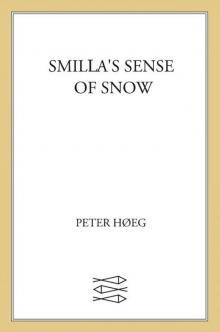 Smilla's Sense of Snow
Smilla's Sense of Snow Borderliners
Borderliners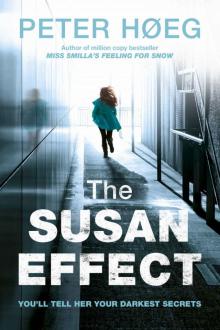 The Susan Effect
The Susan Effect The History of Danish Dreams
The History of Danish Dreams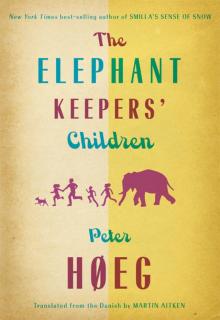 The Elephant Keepers' Children
The Elephant Keepers' Children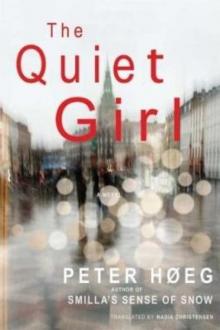 The Quiet Girl - Peter Hoeg
The Quiet Girl - Peter Hoeg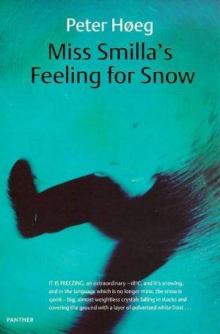 Smilla's Sense of Snow aka Miss Smilla's Feeling for Snow
Smilla's Sense of Snow aka Miss Smilla's Feeling for Snow